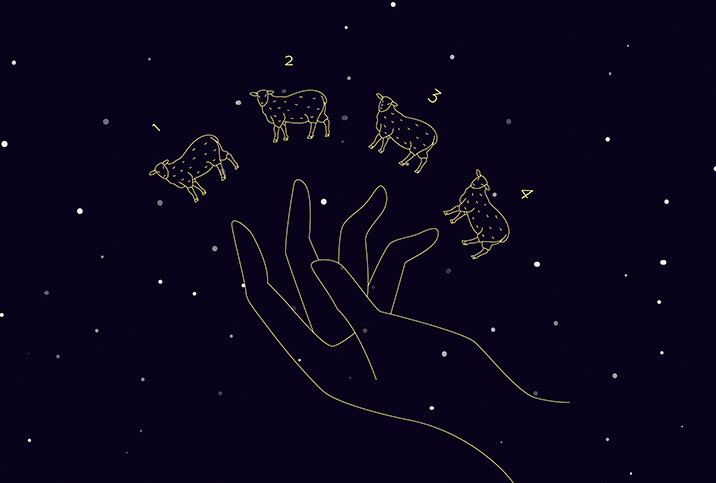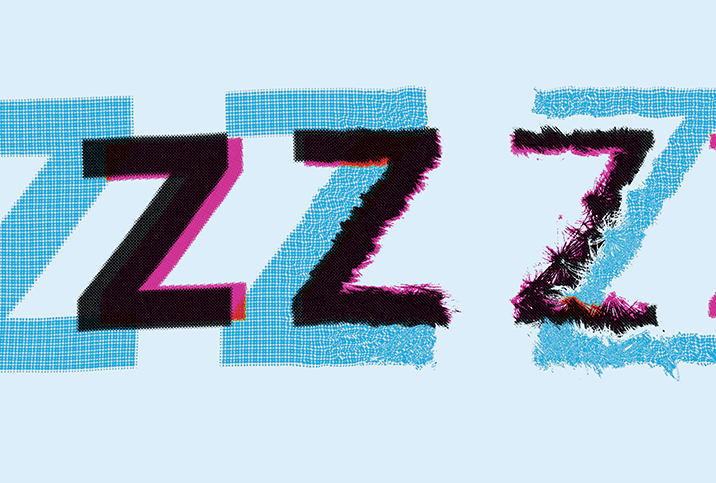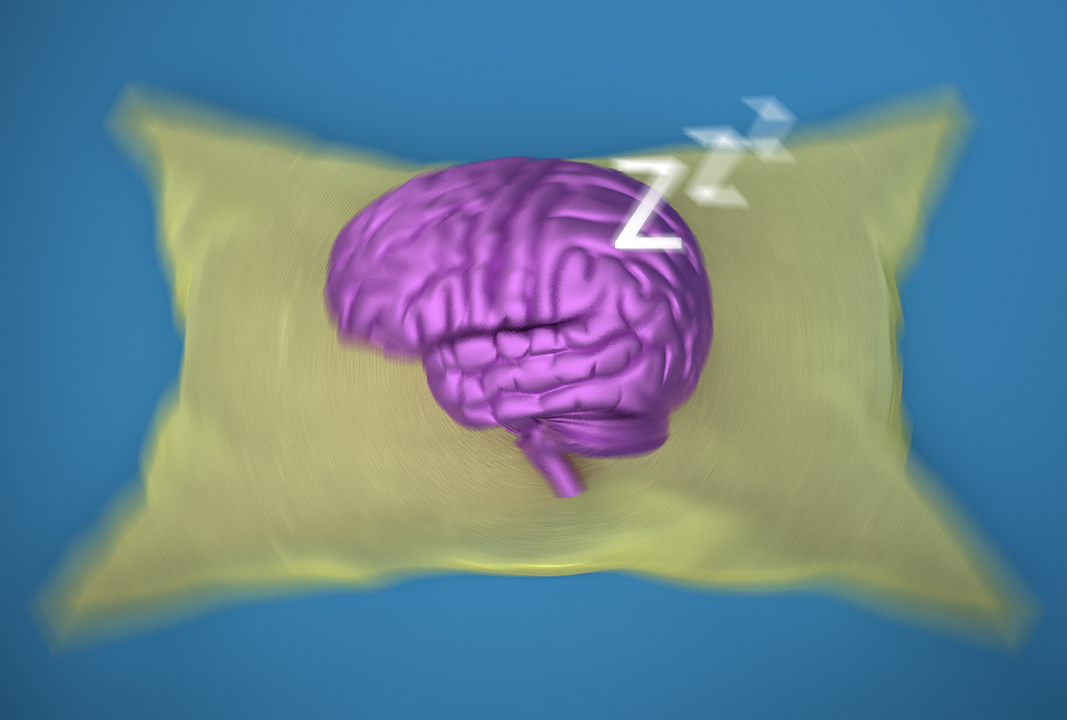When Counting Sheep Isn't Enough

Lying on my back and staring at the sky, I felt as if I was floating. It was a surreal sensation, though not unpleasurable. After about 80 straight hours of being awake, I'd just smoked cannabidiol (CBD) for the first time. After a few minutes and a couple of hits, my heartbeat, which had been pounding at a breakneck tempo for days, began to slow.
I'd spent that day trying to convince a medical professional—any medical professional—to prescribe me a sedative to combat this prolonged period of insomnia I feared would never end. When that approach didn't work and I left the clinic empty-handed, I called my dad.
"You know what you need? CBD," he told me as I nervously paced around my yard. "A couple hits of that and you'll be sleeping like a baby."
He was right. I finally slept seven hours straight after living four long days rolled into one hazy fever dream. But CBD, the ingredient in marijuana that promotes relaxation rather than a high, wasn't some golden ticket that eliminated all my sleep woes.
In fact, there's no quick fix to insomnia, especially insomnia fueled by anxiety, depression or any other underlying illness. It takes time. For me, the road to regular, restful sleep was marked by developing practices in sleep hygiene and mindfulness, seeking help for mental illness, and letting go and accepting that this phenomenon is part of me.
Sleep hygiene
In 2022, streaming our favorite shows or endlessly scrolling social media from our beds at night might seem like fun ways to combat the "Sunday scaries," but these activities actually contribute to poor sleep health, inundating our minds with stimuli at a time of day when the opposite is needed. I spoke to my friend John David Eriksen, from Gainesville, Florida, who's also experienced bouts of insomnia over the years, about how these behaviors affect his sleep.
"Scrolling through social media and refreshing news websites before bed can definitely make my insomnia worse, especially if people I follow are arguing with each other online or sharing upsetting news stories," Eriksen said. "Podcasts are a good way for me to enjoy passive entertainment that interferes with my sleep less."
'Scrolling through social media and refreshing news websites before bed can definitely make my insomnia worse'
Reducing screen time at night is only one way to improve sleep hygiene. For instance, another key to restful nights is keeping a "sleep sanctuary," according to Michael Jaffee, the vice chair of the University of Florida neurology department who is board-certified in neurology, sleep medicine, psychiatry and brain injury medicine.
"Control the environment in your bedroom," Jaffee explained. "Wear a blindfold or earplugs if light or noise is bothering you. Keep the bed for sleep and sex, nothing stressful like paying the bills. Set the thermostat lower—colder temperatures tell the body to rest. Or try taking a hot shower or bath before bedtime so the body responds to the temperature change. Our bodies release natural melatonin when the sun goes down and the lights go off. Blue light especially inhibits that natural melatonin from being released. That's exactly the kind of light emitted by our phones and computers."
Meditation and mindfulness
Surely you've heard that counting sheep can help the mind drift off to sleep, but many people don't realize this centuries-old recommendation is an exercise in meditation. Developing a daily meditation practice with the help of an app—Headspace is my current favorite—proved a turning point in my insomnia journey.
Meditation can include focusing on each long exhale and placing a hand on my belly to follow how it rises and falls. Sometimes, it involves counting each inhale and exhale up to 10 and then starting back at one. Other times, it's tensing and relaxing each body part, starting with the toes and working my way up to finally unfurrow my brow. Focusing on my breath and the physical experience of my body against the mattress prevents my mind from latching so intently onto the racing thoughts and worries that can plague me when my head hits the pillow.
Jaffee recommended further mindfulness and cognitive practices that can help the mind lay itself to rest.
"Try a cognitive trick to distract yourself, like using your imagination to create a list: What songs are on your perfect playlist? What would your perfect vacation home look like?" Jaffee said. "Another technique is not trying so hard to sleep. Some people lay in a dark room and tell themselves to stay awake. That paradoxical thinking approach can help some. If you're not sleeping after 20 minutes, get out of bed and sit in another dark place.
"Some experts say if you write down the thoughts keeping you awake and then write, 'It can wait until tomorrow,' that can help," he added. "If it's something out of your control, own it, accept it and learn to let it go. Of course, there's no one solution for everyone. You have to find the techniques that work for you."
Seeking help for underlying illnesses
Off and on throughout my 20s, I took Unisom, an over-the-counter sleep aid. A couple of days before my 30th birthday—an event that created great existential dread and anxiety—the effects of the sleep aid finally wore off, causing me to remain awake for four straight days.
When I first sought medical attention for my insomnia, I thought I needed stronger sleeping pills or a sedative. The doctor told me I had anxiety and recommended antianxiety medication. I scoffed at the doctor and refused the pills, but about a year later, when I was diagnosed with obsessive-compulsive disorder (OCD) and panic disorder, I realized how much mental health affects my sleep. After beginning exposure and response prevention therapy (ERP)—the gold-standard treatment for OCD—I found my sleep improved by leaps and bounds.
Along those lines, Jaffee advised seeing a doctor to ensure there's no underlying physical or mental illness causing your insomnia.
"Insomnia is very common," Jaffee explained. "The prevalence has been estimated to be up to 20 percent of adults in some studies. Sometimes, people with anxiety have trouble falling asleep. With depression, there's trouble staying asleep. Racing thoughts can be caused by anxiety, ADHD, OCD, bipolar disorder and a type of depression where people can become agitated as part of it. Insomnia can sometimes be a medication side effect. Certain medical conditions can be associated with increased arousal in the body, like thyroid dysfunction or overproduction of cortisol from the adrenal gland."
Sometimes, a persistent physical health issue may seem under control, yet its impact extends to our mental and emotional health, thereby contributing to sleep problems. Eriksen said maintaining a physical therapy regimen prevents chronic pain—and its effects on mental and emotional health—from disturbing his rest.
"I do my physical therapy exercises for back pain before bed. I also do very light warm-ups," he noted. "These reduce my pain levels and make it feel more comfortable to lay down. It's important for me to address issues with chronic pain through structured rest, massage and acupuncture, physical therapy and mental health counseling.
"My massage therapists and acupuncturists create space to talk about my chronic pain in a way that helps not just my chronic pain but also my mental health," Eriksen continued. "For me, insomnia is very much linked to my overall emotional state. Any activity of self-discovery and any practice of self-care has an impact on my overall emotional state and, therefore, my quality of sleep."
Acceptance is the key
These days, I sleep pretty well. I've found using a white noise machine and taking melatonin helps. Jaffee explained that melatonin can be used to reset the internal circadian clock in some cases. For that function, it's best taken at sundown, but the use of melatonin should always be discussed with a doctor, he added. Some nights, I take a puff or two of CBD after my 10-minute meditation. Other nights, I fall asleep too quickly to remember to grab the CBD pen.
This newfound sleep success is not because the anxieties and worries that plague me have disappeared—I've struggled mightily with my mental health in recent months—but somehow, I'm able to accept where I'm at in life. I lay my baggage and armor at the door, scatter my fears about the dark room, exhale deeply and allow the night to take me. Somehow, in that letting go, I've been lucky enough to sleep deeply, dreaming of oceans that defy gravity and roads that seem at once foreign and familiar.
Still, some nights, sleep doesn't come, especially if alcohol is involved. On these restless nights, I make a conscious effort to acknowledge the panic and fear as it arises, thank these feelings and resolve to let them dissolve.
As Jaffee told me, "Even if we're doing well and then we have a bad night, that's not a cause to catastrophize. We can get back on track." And that's what I do.


















